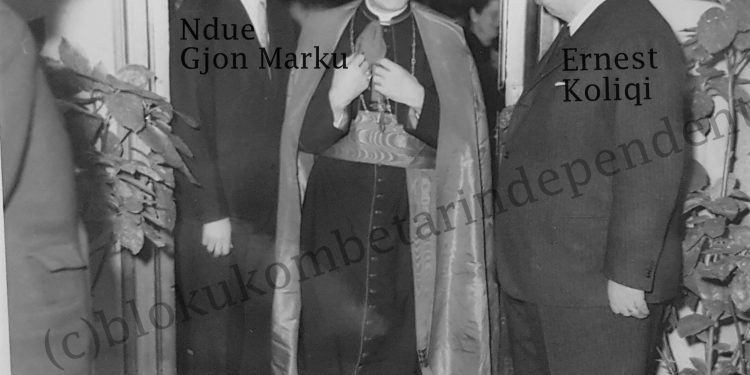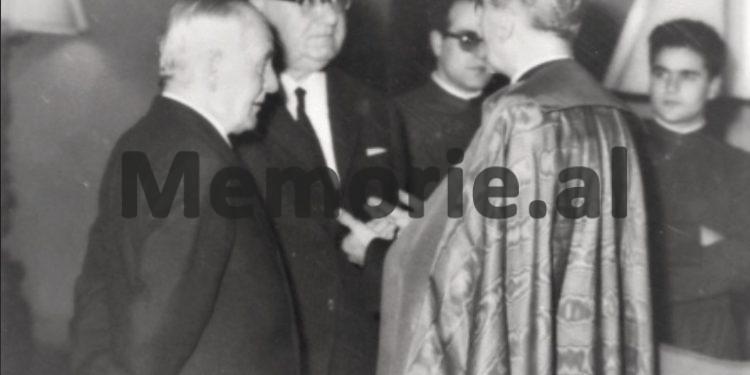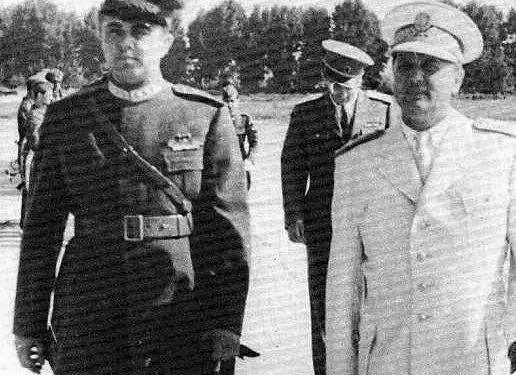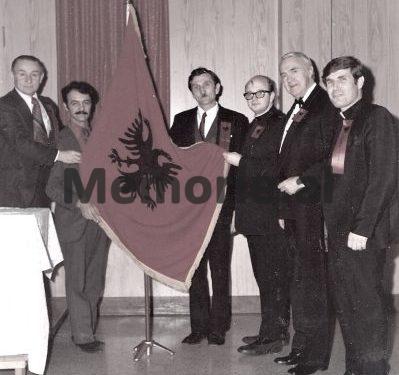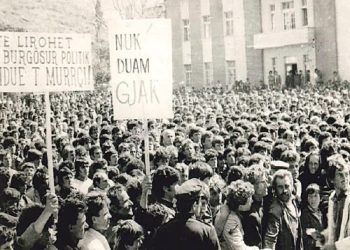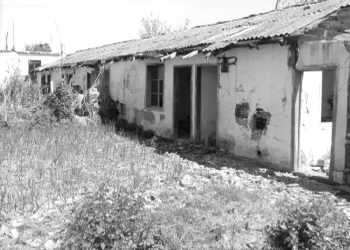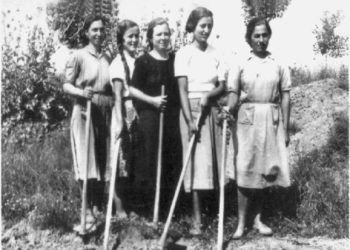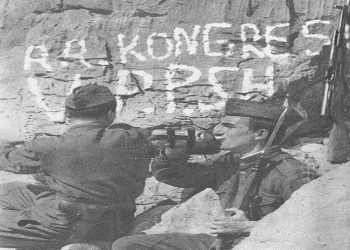By Idriz Lamaj
“ALBANIAN YOUTH IN EXILE”, THE FORGOTTEN MAGAZINE OF THE 70’S –
Memorie.al / Journalism of Albanians in America is a precious treasure for analyzing the historical developments of the Albanian people in the ethnic homeland and the activity of Albanian-American immigrants in the USA. From the beginning of the last century until today, Albanian emigrants in this country published dozens of different newspapers and magazines. The activists in this field were idealistic intellectuals who published newspapers and magazines with their own efforts and expenses and the few friends and close associates they could have. Over time, traces of their publications disappear, with the exception of the newspaper “Dielli”, which has been published for 102 years. In the last two decades, due to historical developments in Kosovo and Albania, the newspapers “Illyria” and “Bota Sot” are published in New York.
At the beginning of the 70s, Fran Shkreli started publishing the magazine “Albanian Youth in Exile”. The publication of this magazine begins at a time of significant national and international political changes. The relations between Pristina and Tirana in the 70s, in addition to their cultural importance, also brought about the strengthening of the political campaign of communism against Albanian nationalism in exile.
The political propaganda of the communist regime of Tirana deeply influenced the Albanian youth of Kosovo. For the first time after the Second World War, in the media of Kosovo (in newspapers and magazines), a visible political-ideological campaign began against the Albanian nationalist diaspora, against the Albanian Catholic Clergy, and against “American imperialism”.
There were intellectuals and emigrants, matured by age, ex-politically persecuted, suffered in the forced labor camps and prisons of the communist regime of Albania, who, in that period, softened their stance against communism. The influence of communist propaganda in exile can be seen in their writings, where from time to time they talk about “great progress in the field of education and economy” in Albania.
On the other hand, the end of the war in Vietnam and the withdrawal of American forces from that country clouded the minds of many American university circles, especially professors and students, presenting communism as a kind of not bad ideology. In that decade of deep national and international political upheavals, Fran Shkreli (at the age of 22) started publishing the magazine “Albanian Youth in Exile”.
In January 1972, its first issue appeared in New York, beginning with this editorial:
“I talked to you some time ago, he told me: When a person lives freely, enjoys his rights in writing, expresses himself and thinks freely, it is a sin not to take advantage of this freedom, for the good of us, the Nation and of Albanian culture. Encouraged by some young people, and supported by their cooperation, we are starting to publish this new organ, to which we gave the title, “Albanian Youth in Exile”.
Why shouldn’t our youth have their own organ, where they would express their thoughts as they think, freely without anyone else guiding them, of course, you should see the work of the elders, you should accept what is good and successful, you leave those who can marry me? It is therefore necessary that we start ourselves.
We know that someone may have convinced me, they have not taken this job seriously, and they have called us unqualified for this undertaking. We know our possibilities and abilities. They are not big, but they are enough. We will also do our best that I meet in our circle. We accept criticism, but it must be sound, with a constructive character and good intentions. I am asking our readers, mainly those who are able to, give us directives, instructions, and help us in this matter. As we said, comments with a constructive character are always welcome.
We know that every beginning is difficult, but we believe in God’s help, in our powers and in the will of the people. We are not doing this, neither to insult the city, nor to reduce or defeat the action of anyone so far. No! On the contrary, we welcome and appreciate their activity. So don’t get us wrong, but help us out! (“Social conversations”, R. SH. M. Page 1, no. 1).
In the same issue (p. 3), the publisher brings the article entitled “Ethnic Albania”, where, among other things, he writes: “The gigantic match of the Great Powers, you changed the map of Europe here and there, especially the map of the Balkans, has revived once again the issue of the independence of all nations, both large and small, and the issue of their borders; an important and delicate issue on which depends the future of freedom, justice and peace, which is my burning desire the whole human race”.
According to this article, the issue of independence and borders is not only a matter of political fairness, but also a moral and legal issue. And, “the main problem for us Albanians and for our homeland is: Albania which seeks the recovery of political independence within its ethnic borders. Albania which seeks Chameria, Manastir and its districts, Kosovo, Tivar, Ulcinj, Plava, Guca, New Market and Skopje with districts; Albania has a stake in this independence and above all these countries”.
In this condensed article, it is written that the demands of the Albanians are based on the strongest, soundest and most irrefutable arguments. In the end, he severely criticizes the communist regime of Tirana, about which he writes that; “He speaks before the United Nations about the rights of the great Chinese people, as before about the rights of the great Russian people, while the issue of Kosovo, he does not speak, because he has given it to the Slavs”!
The person in charge of the magazine to document the political bargaining of the political hierarchy of the Albanian communists and their bringing to power by the Serb-Montenegros, writes: “We are sending some parts of the letters that Enver and his friends exchanged with their Yugoslav ‘friends’. Enver Hoxha in sent the letter to Tito on September 23, 1944, among other things he wrote: ‘The straight and clear line of the heroic Communist Party of Yugoslavia has not only been a light for us, which illuminates our path, but at the same time it has been a strong support.
Our two parties have established the brotherhood of our two peoples. Our party feels powerful because its horn is the great Party of Yugoslavia and its wise leader Marshal Tito.
Enver writes to Mugosha, whose real name he could not even reveal, until Dushan returned to Yugoslavia, forever. From this you can see how loyal Enveri and his friends were to the Serbian Dushan, so much so that he didn’t even tell them his real name; they knew Dushani as Sala. Enver writes to Ali (Miladin Popoviqi, mark I.L.) that you are stronger than us.
We will start a small course of conferences, with these topics: The first and second imperialist war – just and unjust war”. Just and unjust war, a fact that has been carried out on the Albanian people for more than 25 years now. “Injustice has been used and is being used even now in Albania. It is necessary and right for the communist regime to start using justice.” (R.SH.M. N.3, pp. 2-3).
In that long editorial article, he also brings paragraphs of letters from Hysni Kapos, Koçi Xoxes and other serfs of the Serbo-Montenegros, who brought them to power thanks to the fratricidal civil war they created in Albania, just to keep Kosovo and other territories under their conquering hoof and the isolated, humiliated, oppressed and poor Albanian people.
In numbers 2 and 3, Shkreli brings harsh reactions against journalists in his magazine; Ali Sutaj, Jusuf Ferizi and Ragip Beqaj. They had started a strong campaign against Albanian immigration and the activity of the Catholic Clergy in the newspaper “Rilindja” of Pristina. Their writings were nothing but imitations of the communist press of Albania.
If you read those writings, they are simply to please the communist regime of Tirana, because the strong communication between Pristina and Tirana had begun, while the Yugoslav state circles liked such polemics against the emigrants, because in those writings the efforts of the Albanians were fought on the issue of Kosovo and striking figures of nationalism. Whereas, as far as the Catholic Clergy is concerned, the Slavic-communist policy has always been frowned upon.
Here it should be noted that the Renaissance journalists accredited by the United Nations, in that period wrote from time to time against the activity of the Albanian emigration in the USA and against the American government, describing it as an imperialist state.
In each issue of the magazine, Mr. Shkreli opposes the propaganda of the communist journalists of Pristina and Tirana, in an unprecedented way. He defends Albanian nationalism in exile, with the strength of strong historical arguments, calling the “National Liberation” War more like a fratricidal war and occupation than an anti-fascist war.
Shkreli, at a very young age, in addition to studying at the University, writes, selects subjects for publication, edits, typesets, translates, pages, distributes the magazine, maintains correspondence with its readers and with personalities of the pen. In issue 3 of the magazine, these two letters are published:
Prof. Ernest Koliqi writes:
Dear Fran, “I have received both your letter and No. 1 of the periodical “Albanian Youth in Exile”. I am glad, first of all, that you are well, that you are trying to follow your studies and, in the end, for the publication dedicated to the new mass, that far from the homeland, it needs to be fed with healthy Albanian writings, good luck!
It’s a thread full of promises. I remember the old saying: “The good man has many friends”! Avit peers as much as you can. If this quarterly notebook will also deal with literature, don’t forget the authors that the communist regime of Tirana has excluded from the history of Albanian literature. I have had a lot of work lately, that’s why I was late to answer.”
Sincerely, Ernest Koliqi.
Whereas, Prof. Rexhep Krasniqi, writes:
“I love Mr. Shkreli — I received your letter today, and even though I am busy with other work, I am answering it immediately. Unfortunately, until today I have not had the chance to meet you, but two things have caught my eye about you. First of all, you work, and at the same time, continue your schooling, and since you are young, I have great hope that with time and sacrifice, you will finally be able to finish these lessons, and thus, join the ranks of the few Albanians of this category in this country.
I have just read the two issues of the temporary magazine “Albanian Youth in Exile”. Each beginning is difficult, but from the content of the articles you have published, it seems to me that you are on the right track, which is in line with your motto; “Lux et Veritas” and we hope that, in time, your brochure will be a summary of the new powers of culture and the virtues of the Albanian nationality, in this country of freedom and progress.
I thank you for the kind words you express towards the “Free Albania” Committee and the work that this committee has and strives to do in supporting the issues of our compatriots in this country, and those who have been enslaved by the totalitarian regime in the homeland.
With that, I wish you good health and good work, as well as Easter for many years to come. I remain with respect – Dr. Rexhep Krasniqi
The above letters to Mr. Shkreli were great moral support and appreciation of his work. The fourth issue of the magazine, compared to the previous issues, looks richer. In addition to a touching and documentary writing of the magazine’s contributor, Mr. Ndoc Vulaj, on the life and activity of Ndre Mjeda, Mr. Shkreli also writes about political developments in the USA and the election of President Nixon, in the 1972-1976 mandates.
There (pg. 7) is a letter in English addressed to the “Lehman” College, on the occasion of the presidential elections entitled; “More than ever”, in which Mr. Shkreli responds to the College magazine “Meridian”, which expressed regret for the election result in favor of President Nixon, the so-called; “Vietnamese syndrome” Mr. Shkreli replies: “We all know, or we should all know, that Communism is a great danger to the free world. American involvement in Vietnam is nothing but a guarantee of freedom and self-determination for the Vietnamese people and hope for all other nations, who live under the terrorist hoof of communism, of all those nations”. (R.SH.M, No. 4 p. 9)
A serious collaborator and all-round supporter of the magazine is Ndoc Vulaj, the sharp pen of the time and researcher of various fields of our national culture. Another collaborator of the magazine was Gjeto Sinishtaj. He enriched the magazine with poems, expressing his feelings about the ethnic homeland and the painful life in exile.
The magazine “Albanian Youth in Exile” (R.SH.M.) occupies a special place in the journalism of Albanian anti-communist emigration. This is the first magazine founded and directed by a student, who makes serious efforts to unite, organize and raise the voice of Albanian youth in this country. Another importance of this magazine is its political and historical orientation. R.SH.M. waged an uncompromising war against the communist ideology in general and, in particular, against the communist regime in Albania.
In this notebook, communism is discredited in all areas.
On the pages of the magazine R.SH.M. many English articles of Fran Shkreli, published in the magazine “Meridian”, published at the time by the university where he studied, have been reprinted. If these articles are read carefully, it can be seen that Mr. Shkreli holds the same position. He argues fiercely with American liberal professors, bringing the names of some of them, who “preached” and considered communism, as not a bad thing, but as a workers’ movement, etc.
Shkreli takes a strong conservative stance on these views, and from that time until today, he has not made the slightest change or concession to his views. Eight issues of the magazine were published, then (in 1974) Mr. Shkreli is employed in the Albanian section of “Voice of America”. He worked in Washington, more than three decades, until he retired. From a young worker, he managed to lead the Albanian Service and other Services, including the Soviet one.
Even today, in his writings, Fran Shkreli remains what he was; a man imbued with high nationalist ideals, researcher and analyst equipped with deep national and international political culture. Who knows how many services Fran did to his country while working in Washington! Memorie.al




